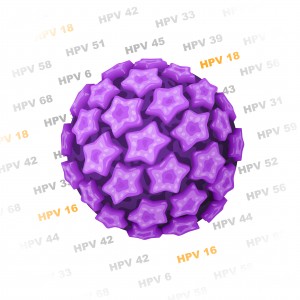Multiple Sclerosis Risk Does not Increase with HPV Vaccine According to Study
Written by |

 Human papillomavirus (HPV) vaccination can help protect against several health problems, including cervical cancers in women. Some reports have raised concerns however, that the vaccine might actually increase the risk of developing multiple sclerosis. A study entitled “Quadrivalent HPV Vaccination and Risk of Multiple Sclerosis and Other Demyelinating Diseases of the Central Nervous System,” published in the January 6th issue of the Journal of the American Medical Association (JAMA) could puts such fears to rest.
Human papillomavirus (HPV) vaccination can help protect against several health problems, including cervical cancers in women. Some reports have raised concerns however, that the vaccine might actually increase the risk of developing multiple sclerosis. A study entitled “Quadrivalent HPV Vaccination and Risk of Multiple Sclerosis and Other Demyelinating Diseases of the Central Nervous System,” published in the January 6th issue of the Journal of the American Medical Association (JAMA) could puts such fears to rest.
To date, doctors have administered over 175 million doses of the quadrivalent human papillomavirus (qHPV) vaccine (Gardasil) and bivalent HPV (bHPV) vaccine (Cervarix), to help prevent HPV related medical conditions. HPV vaccines consist of three shots over 6 months. Cervarix and Gardasil both prevent of cervical cancer in women. Gardasil protects against cancers of the anus, vagina and vulva as well as against genital warts. Only Gardasil is available for men.
Multiple sclerosis is a neurological condition characterized by the loss of insulating myelin around nerve cells. This results in several problems including difficulties with movement, pain and loss of sensation. Because multiple sclerosis is an autoimmune disease, some people fear that introducing outside factors into the body, such as vaccines, might provoke the immune system and result in this condition.
Social and news media have indeed reported individual cases of multiple sclerosis following HPV vaccination, with additional case reports published in the medical literature. This has led to public concerns of a causal relationship between the demyelinating disease and HPV vaccination.
A study lead by Nikolai Madrid Scheller, M.B., of the Statens Serum Institut, Copenhagen, Denmark, and co-workers, included Danish and Swedish girls and women ages 10 to 44 years, examined from 2006 to 2013. The first HPV vaccine was introduced to the public in 2006. Using nationwide registers the researchers collected information on HPV vaccination, and data on multiple sclerosis diagnosis.
[adrotate group=”4″]
The scientists obtained information on 3,983,824 girls and women of which, 789,082 were vaccinated from 2006-2013, with 1,927,581 HPV vaccine doses. The researchers were able to identify 4,322 multiple sclerosis cases as well as 3,300 cases of other demyelinating diseases. Of these 73 and 90, respectively, happened two years after vaccination. Based on this analysis, the study authors concluded that there was no statistically significant risk of developing multiple sclerosis following HPV vaccination, stating “These findings do not support concerns about a causal relationship between qHPV vaccination and demyelinating diseases. Our study adds to the body of data that support a favorable overall safety profile of the qHPV vaccine and expands on this knowledge by providing comprehensive analyses of multiple sclerosis and other demyelinating diseases. The size of the study and the use of nationwide registry data of unselected populations from Denmark and Sweden allowed adequately powered analyses that are likely generalizable.”
Based on these results, HPV vaccines are very unlikely to increase risk for multiple sclerosis and individual case reports of the disease following HPV vaccination are most likely due to random chance rather than the HPV vaccine.


